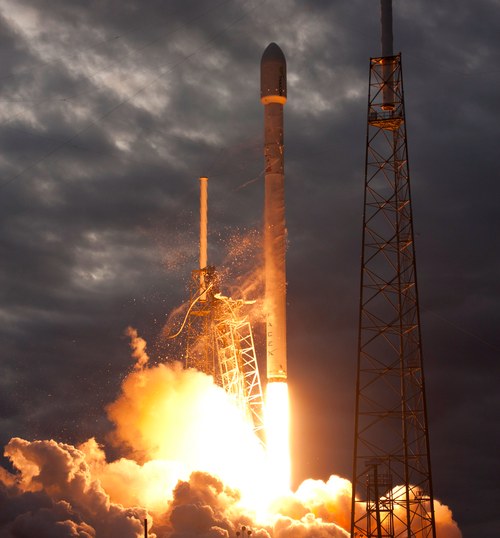
A Falcon 9 v1.1 lifts off from Cape Canaveral on January 6, 2014, carrying the Thaicom 6 satellite. This was the third of three launches certified as successful by the Air Force. (credit: SpaceX)
As SpaceX battles with the Air Force on one front, suing the service to contest a “block buy” launch contract awarded to United Launch Alliance, it is also working with the Air Force to get the Falcon 9 rocket certified to perform launches of military satellites under the Evolved Expendable Launch Vehicle (EELV) program. On Friday, SpaceX announced a major milestone in that certification process: the Air Force has certified the first three Falcon 9 v1.1 launches, performed from late September 2013 through early January 2014, as successful.
As part of the overall certification process, a company must perform three successful launches of its vehicle, and have the success of those launches certified by the Air Force. The Air Force has signed off on the first Falcon 9 launch as a success previously (despite an issue restarting the rocket’s second stage after it deployed its payloads); Friday’s announcement covers the launches of commercial communications satellites in December and January. “Meeting the criteria for successful flights is a key milestone in the certification process,” SpaceX noted in its brief statement.
It is not the only milestone, though, as the Air Force has to thoroughly review the performance and reliability of the Falcon 9 v1.1, an ongoing process. SpaceX officials have previously said they hope to have the process completed by the end of the year, although Air Force officials have suggested it may not be done until early 2015.
This process has continued even as SpaceX sued the Air Force in April, contesting a block buy contract for EELV launches the Air Force awarded to ULA last year. That has caused some friction in the SpaceX-Air Force relationship, although Elon Musk has noted that his company is on good relations with most people in the Air Force, with the exception of those responsible for the block buy award.
The Air Force, meanwhile, has insisted it is serious about promoting competition for launch services and certifying companies like SpaceX. “When you’re spending $60 million and putting 100 people against the problem to get somebody certified, it’s hard to say you’re excluding them,” said Gen. William Shelton, head of Air Force Space Command, in a briefing with reporters during the 30th Space Symposium in Colorado Springs in May.
Shelton noted the three launches—which, at the time of the briefing, only one had been approved as successful by the Air Force—are just “openers” in the certification process. “There’s a tremendous amount of analysis that needs to be completed, and it’s in cooperation with SpaceX,” he said. That includes analysis of manufacturing and engineering processes, and an “auditable” financial system. “It’s very difficult to pick up the pace on that. It just takes time, it takes money, it takes people. And I think SpaceX would have a hard time going faster than they are right now.”

Leave a Reply